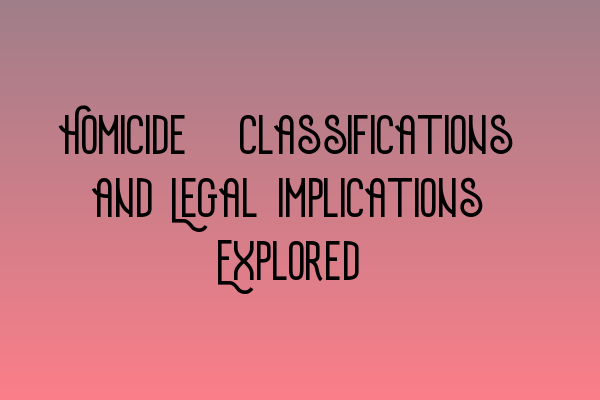Homicide: Classifications and Legal Implications Explored
Homicide is one of the most serious crimes under the criminal law system. It involves the unlawful killing of another person and carries severe legal consequences. In this blog post, we will delve into the classifications of homicide and explore the legal implications associated with each category.
1. Murder
Murder is the most severe form of homicide, characterized by the intentional and unlawful killing of another person with malice aforethought. Malice aforethought refers to the presence of intent to cause serious harm or take someone’s life. The act of murder carries a mandatory life sentence in the UK, and the prosecution must prove all elements beyond a reasonable doubt to secure a conviction. To further understand murder and its legal complexities, take a look at our SQE 1 Practice Exam Questions.
2. Manslaughter
Manslaughter differs from murder in that it does not involve malice aforethought. It is the unlawful killing of another person without intent or premeditation. Manslaughter can be further classified into voluntary manslaughter, which occurs in the heat of the moment, and involuntary manslaughter, which is typically a result of negligence or reckless behavior. Understanding the distinctions between these categories is essential for legal professionals. Test your knowledge with our SQE 1 Practice Mocks FLK1 FLK2.
3. Infanticide
Infanticide is a unique category within homicide, specifically relating to the killing of an infant aged under one year by their mother. This offense recognizes the emotional and psychological factors that may influence a mother’s actions during the postnatal period. Infanticide has specific legal implications that deviate from traditional murder or manslaughter charges. To gain a comprehensive understanding of infanticide and its legal framework, explore our SQE 2 Preparation Courses.
4. Corporate Homicide
Corporate homicide refers to situations where a company or organization’s actions or failures result in someone’s death. This category recognizes the responsibility corporations have in ensuring the safety and well-being of their employees and the public. Corporate manslaughter laws aim to hold entities accountable for their actions or negligence that lead to fatal consequences. Legal professionals involved in corporate law and workplace safety should familiarize themselves with the intricacies of corporate homicide and the necessary legal steps to pursue justice. Discover more about corporate law by checking out our SQE 1 Preparation Courses.
5. Justifiable Homicide
Justifiable homicide refers to cases where a person’s actions leading to the death of another individual are deemed legally justified. These situations typically involve self-defense, defense of others, or actions taken by law enforcement officers in the line of duty. Understanding the legal parameters and reasonable justifications for taking a person’s life in self-defense or defense of others is crucial for legal professionals and aspiring solicitors. Stay up to date with the latest legal updates and exam dates at the SRA SQE Exam Dates.
